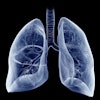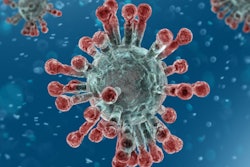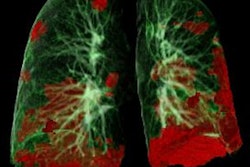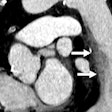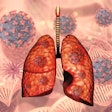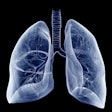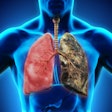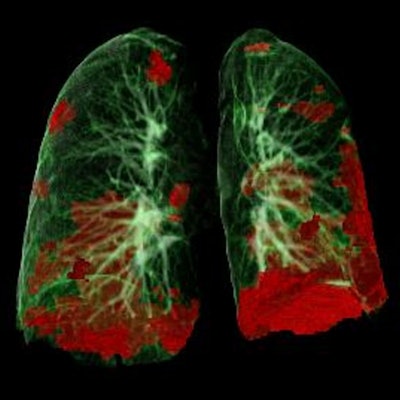
A scale that rates the severity of disease in COVID-19 patients based on CT scans correlates well with elevated laboratory test results in COVID-19 patients, according to a study published September 22 in the International Journal of Clinical Practice.
The findings suggest a way to speed the diagnosis of COVID-19, in part because using CT and lab results may be quicker than waiting for reverse transcription polymerase chain reaction (RT-PCR) testing, wrote a group led by Dr. Qunying Lin of Putian University in China.
"Currently, the diagnosis of COVID-19 mainly depends on nucleic acid testing ... [which] requires that the specimen be shipped to a laboratory offering the test and then waiting for the test result, leading to delays in the confirmation of infection," the team wrote.
Studies have shown a connection between CT scores and the severity of COVID-19, but there are few that have investigated associations between CT scores and laboratory indicators of the disease, according to the authors.
"Chest CT is one of the important diagnostic criteria for the diagnosis of COVID-19, and its severity is an important reference to determine the severity of the patient's condition," the researchers wrote. "However, there is no such study on the correlation between [chest CT score] severity and the clinical indicators of the patient."
Lin's group conducted a study that included 56 patients with COVID-19 pneumonia diagnosed and treated at the Affiliated Hospital of Putian University between January and March 2020. Mean patient age was 46 years. Of these 56 patients, 27 (48.2%) had a history of travel to Wuhan, China, where the virus was first identified, and 29 (51.8%) were in contact with people who had traveled to Wuhan.
All patients underwent chest CT scans. Six lung areas were scored on a scale of 0 to 4 regarding disease involvement in the lung, with higher scores indicating more severe disease. These six scores were added for a total score, with 24 indicating the highest possible disease severity. Study participants were categorized into mild (0 to 3), moderate (4 to 6), and severe (6 or higher) CT severity scores.
Most patients (89.3%) had moderate COVID-19 disease; half (28) had comorbidities such as diabetes, chronic hepatitis, chronic obstructive pulmonary disease, hypertension, and fatty liver. Hypertension was the most common comorbidity, according to the authors.
On CT, the most lesion-affected areas were bilateral lung fields (78.6%) and low lung fields (53.6%). Most common findings were lesions with patchy opacities (87.5%), followed by ground-glass opacities (57.1%).
Patients with moderate COVID-19 had higher CT scores than those with mild disease (5.06 compared with 1.87), while those with severe disease had the highest CT scores (10.71) compared with those with moderate or mild.
The researchers explored correlations between chest CT score severity and the following laboratory measures:
- Blood biochemistry
- Blood cell analysis
- C-reactive protein (CRP)
- Erythrocyte sedimentation rate (ESR)
- Lactate dehydrogenase (LDH)
Lin and colleagues found that higher CT score severity correlated with higher levels of C-reactive protein, erythrocyte sedimentation rate, and lactate dehydrogenase measures.
| Correlation between chest CT severity score and lab results in COVID-19 patients | ||||
| Laboratory measure | CT severity score, mild | CT severity score, moderate | CT severity score, severe | p-value |
| C-reactive protein (mg/L) | 5 | 10.30 | 23.05 | < 0.01 |
| Erythrocyte sedimentation rate (mm/h) | 11 | 34 | 32 | 0.028 |
| Lactate dehydrogenase IU/L | 172.8 | 184.7 | 247.5 | < 0.01 |
Why did these particular laboratory results rather than others link to higher chest CT scores? CRP measures inflammation, and elevated CRP in COVID-19 patients suggests more severe disease; elevated LDH could be linked to diffuse alveolar damage the disease can cause; and faster ESR suggests plasma is more viscous due to inflammation, the group noted.
"[Chest] CT severity of patients with COVID-19 is closely correlated with COVID-19 severity, CRP, LDH, and ESR, and could be an indicator assessing the severity of COVID-19," the team wrote. "These results provide evidence [that could] improve diagnosing and treating COVID-19."


